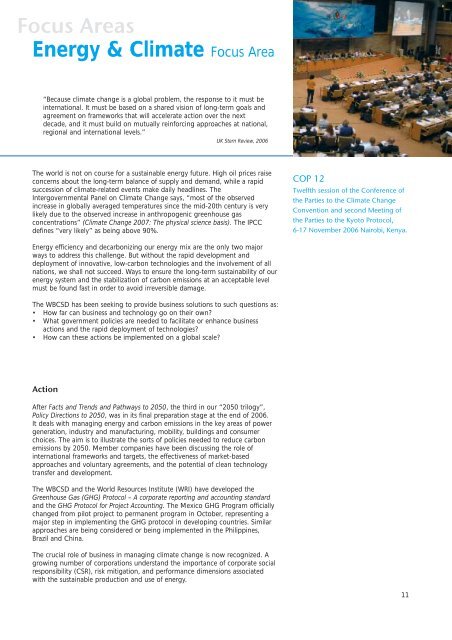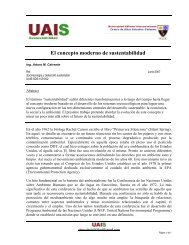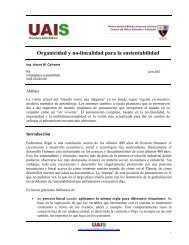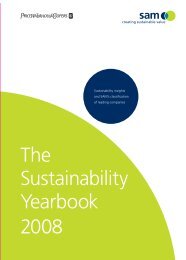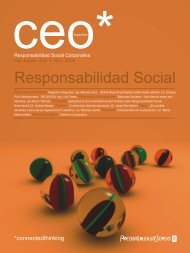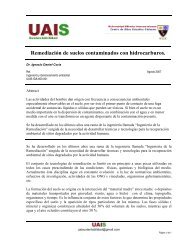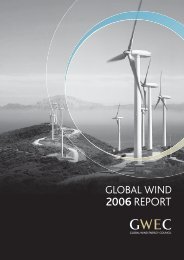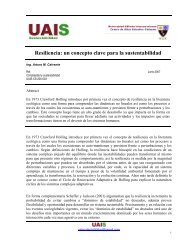WBCSD Annual Review 2006 NEW.qxp - Sustentabilidad.uai.edu.ar
WBCSD Annual Review 2006 NEW.qxp - Sustentabilidad.uai.edu.ar
WBCSD Annual Review 2006 NEW.qxp - Sustentabilidad.uai.edu.ar
Create successful ePaper yourself
Turn your PDF publications into a flip-book with our unique Google optimized e-Paper software.
Focus Areas<br />
Energy & Climate Focus Area<br />
“Because climate change is a global problem, the response to it must be<br />
international. It must be based on a sh<strong>ar</strong>ed vision of long-term goals and<br />
agreement on frameworks that will accelerate action over the next<br />
decade, and it must build on mutually reinforcing approaches at national,<br />
regional and international levels.”<br />
UK Stern <strong>Review</strong>, <strong>2006</strong><br />
The world is not on course for a sustainable energy future. High oil prices raise<br />
concerns about the long-term balance of supply and demand, while a rapid<br />
succession of climate-related events make daily headlines. The<br />
Intergovernmental Panel on Climate Change says, “most of the observed<br />
increase in globally averaged temperatures since the mid-20th century is very<br />
likely due to the observed increase in anthropogenic greenhouse gas<br />
concentrations” (Climate Change 2007: The physical science basis). The IPCC<br />
defines “very likely” as being above 90%.<br />
COP 12<br />
Twelfth session of the Conference of<br />
the P<strong>ar</strong>ties to the Climate Change<br />
Convention and second Meeting of<br />
the P<strong>ar</strong>ties to the Kyoto Protocol,<br />
6-17 November <strong>2006</strong> Nairobi, Kenya.<br />
Energy efficiency and dec<strong>ar</strong>bonizing our energy mix <strong>ar</strong>e the only two major<br />
ways to address this challenge. But without the rapid development and<br />
deployment of innovative, low-c<strong>ar</strong>bon technologies and the involvement of all<br />
nations, we shall not succeed. Ways to ensure the long-term sustainability of our<br />
energy system and the stabilization of c<strong>ar</strong>bon emissions at an acceptable level<br />
must be found fast in order to avoid irreversible damage.<br />
The <strong>WBCSD</strong> has been seeking to provide business solutions to such questions as:<br />
• How f<strong>ar</strong> can business and technology go on their own<br />
• What government policies <strong>ar</strong>e needed to facilitate or enhance business<br />
actions and the rapid deployment of technologies<br />
• How can these actions be implemented on a global scale<br />
Action<br />
After Facts and Trends and Pathways to 2050, the third in our “2050 trilogy”,<br />
Policy Directions to 2050, was in its final prep<strong>ar</strong>ation stage at the end of <strong>2006</strong>.<br />
It deals with managing energy and c<strong>ar</strong>bon emissions in the key <strong>ar</strong>eas of power<br />
generation, industry and manufacturing, mobility, buildings and consumer<br />
choices. The aim is to illustrate the sorts of policies needed to r<strong>edu</strong>ce c<strong>ar</strong>bon<br />
emissions by 2050. Member companies have been discussing the role of<br />
international frameworks and t<strong>ar</strong>gets, the effectiveness of m<strong>ar</strong>ket-based<br />
approaches and volunt<strong>ar</strong>y agreements, and the potential of clean technology<br />
transfer and development.<br />
The <strong>WBCSD</strong> and the World Resources Institute (WRI) have developed the<br />
Greenhouse Gas (GHG) Protocol – A corporate reporting and accounting stand<strong>ar</strong>d<br />
and the GHG Protocol for Project Accounting. The Mexico GHG Program officially<br />
changed from pilot project to permanent program in October, representing a<br />
major step in implementing the GHG protocol in developing countries. Simil<strong>ar</strong><br />
approaches <strong>ar</strong>e being considered or being implemented in the Philippines,<br />
Brazil and China.<br />
The crucial role of business in managing climate change is now recognized. A<br />
growing number of corporations understand the importance of corporate social<br />
responsibility (CSR), risk mitigation, and performance dimensions associated<br />
with the sustainable production and use of energy.<br />
11


